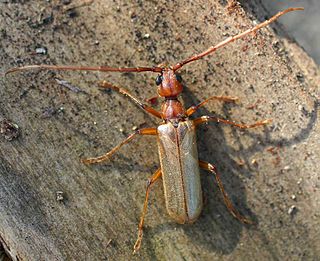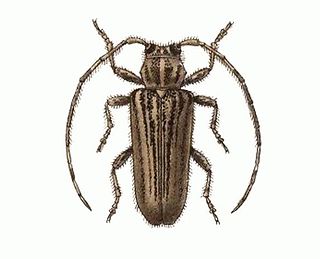Related Research Articles

The longhorn beetles (Cerambycidae), also known as long-horned or longicorns, are a large family of beetles, with over 35,000 species described. Most species are characterized by extremely long antennae, which are often as long as or longer than the beetle's body. In various members of the family, however, the antennae are quite short and such species can be difficult to distinguish from related beetle families such as the Chrysomelidae. The scientific name of this beetle family goes back to a figure from Greek mythology: after an argument with nymphs, the shepherd Cerambus was transformed into a large beetle with horns.

The Chrysomeloidea are an enormous superfamily of beetles, with tens of thousands of species, mostly in the families Cerambycidae and Chrysomelidae, the leaf beetles.

Per Olof Christopher Aurivillius was a Swedish entomologist.

Lamiinae, commonly called flat-faced longhorns, are a subfamily of the longhorn beetle family (Cerambycidae). The subfamily includes over 750 genera, rivaled in diversity within the family only by the subfamily Cerambycinae.

The Disteniidae are a small family of beetles in the superfamily Chrysomeloidea, traditionally treated as a group within the Cerambycidae.

The Oxypeltidae are a small family belonging to the superfamily Chrysomeloidea, widespread in the Andean region of Chile and Argentina. They have traditionally been considered a group within the Cerambycidae.

The Vesperidae are a small family of beetles, normally classified within the family Cerambycidae, of heterogeneous aspect but all characterised by larval stages related to roots of herbaceous plants or trees

Stephan von Breuning was an Austrian entomologist who specialised in the study of beetles (Coleopterology), particularly within the longhorn family (Cerambycidae).

Trachyderini is a tribe of long-horned beetles in the family Cerambycidae. There are at least 140 genera and 650 described species in Trachyderini.
Cosmisoma compsoceroides is a species of beetle in the family Cerambycidae. It was described by Gounelle in 1911.
Cosmisoma humerale is a species of beetle in the family Cerambycidae. It was described by Bates in 1870.
Cosmisoma taunayi is a species of beetle in the family Cerambycidae. It was described by Melzer in 1923.
Dihammaphora vittatithorax' is a species of beetle in the family Cerambycidae. It was described by Gounelle in 1911.
Rhopalophora casignata' is a species of beetle in the family Cerambycidae. It was described by Martins and Napp in 1989.

Onciderini is a tribe of longhorn beetles of the subfamily Lamiinae, they are prevalent across Europe in nations such as Turkey, and Finland.
Dmytro Zajciw was a Ukrainian and Brazilian entomologist, notable for his collection and for his many beetle discoveries. He was born in Velyka Mykhailivka, Ukraine and died in Rio de Janeiro, Brasil. He was the author of Two new genera and species of neotropical Longhorn beetles , 1957, Contribution to the study of Longhorn beetles of Rio de Janeiro , 1958, and was the first to describe the genera Adesmoides and Pseudogrammopsis, as well as the species Beraba angusticollis and Mionochroma subaurosum, among many others.
Estola crassepunctata is a species of beetle in the family Cerambycidae. It was described by Stephan von Breuning in 1940. It is known from Brazil and French Guiana.
Estola parvula is a species of beetle in the family Cerambycidae. It was described by Stephan von Breuning in 1940. It is known from Brazil.

Estola vittulata is a species of beetle in the family Cerambycidae. It was described by Bates in 1874. It is known from Panama, Mexico and Venezuela.
Estola dilloni is a species of beetle in the family Cerambycidae. It was described by Zayas in 1975. It is known from Cuba.
References
- ↑ Bezark, Larry G. A Photographic Catalog of the Cerambycidae of the World Archived 2013-08-27 at the Wayback Machine . Retrieved on 22 May 2012.